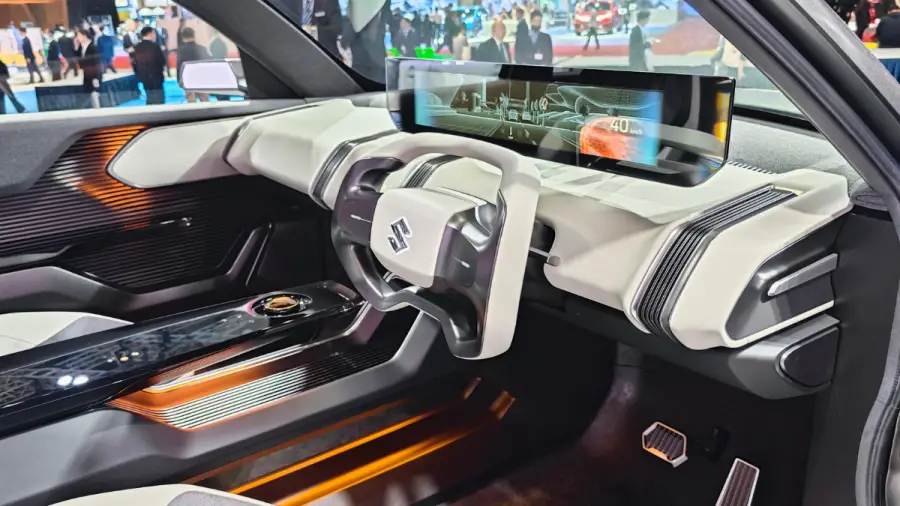In recent years, the automotive industry has witnessed a seismic shift towards sustainable transportation, and Suzuki, a brand synonymous with reliability and efficiency, has not lagged. As the world embraces the electric vehicle (EV) revolution, Suzuki has ventured into the realm of eco-friendly mobility, carving its path toward a greener future.
1. The Collaborative Approach: Suzuki's Partnership with Toyota
Suzuki's initial foray into the electric vehicle market was marked by collaboration rather than solo innovation. Partnering with industry giant Toyota, Suzuki introduced the Across, a plug-in hybrid electric vehicle (PHEV). This collaboration allowed Suzuki to leverage Toyota's expertise in electrification while maintaining its commitment to producing vehicles that are not only efficient but also accessible.
Read: Does Suzuki have an electric car?
2. Across and Swace: A Duo of Hybrid Excellence
The Suzuki Across and Swace testifies to Suzuki's dedication to sustainable driving solutions. The Across, based on the Toyota RAV4, boasts a robust PHEV system that seamlessly combines an electric motor with a gasoline engine. Similarly, the Swace, derived from the Toyota Corolla Touring Sports, presents a stylish hybrid option, blending Suzuki's design flair with Toyota's proven hybrid technology.
3. Solio Hybrid: Practicality Meets Efficiency
Targeting practical urban mobility, Suzuki introduced the Solio Hybrid. This compact vehicle employs a hybrid system, integrating a modest gasoline engine with an electric motor. The Solio Hybrid embodies Suzuki's commitment to providing efficient solutions for everyday driving while maintaining the versatility that customers have come to expect.
4. Concept Cars: A Glimpse into the Future
Beyond the vehicles available in the current lineup, Suzuki has tantalized enthusiasts with electric and plug-in hybrid concept cars. These prototypes offer a glimpse into Suzuki's vision for the future, showcasing the brand's innovation and commitment to sustainable technologies.
5. Meeting the Challenges: Suzuki's Commitment to Sustainability
As Suzuki charts its course in the electric vehicle landscape, it is not without its challenges. The company must address infrastructure concerns, charging accessibility, and consumers' evolving expectations. However, Suzuki's reputation for nimbleness and adaptability positions it well to navigate these challenges, ensuring a seamless transition into the era of electric mobility.
See: SUZUKI e-SURVIVOR
6. The Road Ahead: What to Expect
Suzuki's venture into electric vehicles marks a significant stride toward a more sustainable automotive future. As technology evolves and consumer demand grows, Suzuki is likely to expand its electric vehicle portfolio, offering a broader range of options for drivers seeking eco-friendly alternatives.
In conclusion, Suzuki's electric journey is not just a response to industry trends; it's a commitment to providing greener options without compromising on the qualities that make Suzuki vehicles stand out. With collaborative efforts, innovative designs, and a focus on sustainability, Suzuki is steering towards an electrifying future, one that promises efficient, accessible, and eco-conscious driving experiences for all.

Here is some of one of the all-electric Suzuki eVX
The eVX is an all-electric concept SUV that thanks to a 60kWh battery will have a range of about 550km (340 miles). It is expected to be introduced to the market by 2025.
Suzuki is one of the few legacy car manufacturers that have not yet released a fully electric car, and it seems that fans of the brand will have to wait a few more years for the launch of one.
One of the key features of the eVX concept is its compact size. The car is small enough to maneuver through tight city streets and park in tight spaces, making it a great option for urban drivers. Despite its small size, the eVX concept still has plenty of room for passengers and cargo.
Another notable aspect of the eVX concept is its advanced technology. The car is equipped with a range of sensors and cameras, which allow for advanced driver assistance systems (ADAS) such as automatic emergency braking and lane departure warnings. The car also features a large touchscreen display in the center console, which allows for easy control of the car’s various functions and displays important information such as the battery’s charge level.
Also see: Maruti Suzuki Ertiga Electric Could Be Your Next ‘green’ SUV
The eVX concept also boasts an impressive electric range. Suzuki has not yet released the official range of the car, but they have said that it will be able to travel more than 200 miles on a single charge. This would make it a viable option for longer trips and commutes.
Despite being just a concept, the eVX gives a glimpse of Suzuki’s plan for its electric vehicle lineup, and the company has said that the eVX will be used to guide the development of an all-electric vehicle that will be sold globally. This move towards an all-electric future is in line with the industry trend towards electric vehicles, which are seen as a more sustainable and environmentally friendly alternative to gasoline-powered cars.
Overall, the Suzuki eVX concept is an exciting glimpse into the future of the automaker and the automotive industry as a whole. With its compact size, advanced technology, and impressive electric range, the eVX concept is a car that is sure to appeal to a wide range of drivers. Whether Suzuki brings this concept to production or not, it’s an indicator of Suzuki’s ambition to be part of the electric vehicle market.
The eVX concept car from Suzuki has a sharp and aggressive design that suggests it is off-road ready. However, it is still in the early stages of development and some aspects may change before it goes into production. Suzuki is also working with Immotile, a Canadian company, on a project to develop a two-speed transmission for EVs that would improve efficiency and range. This technology will likely be used in future Suzuki electric vehicles.




